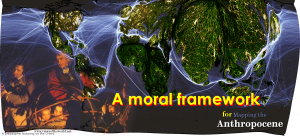
We have adorned the lowest heaven with lamps, missiles for pelting devils. We have prepared a scourge of flames for these, and the scourge of hell for unbelievers: an evil fate!
The Koran 67:6
The Cross is on a mission to explore the terrain of a moral framework without god as its central reference and that recognises the immorality of the mega-machine.
Organised religion, like corporations, and state bureaucracies are evil to the extent that they negate humanity and they are at the extreme edge of negative territory in this regard, right now. The sexual abuse scandal in the church, the corporate trafficking in slave labour the willingness of political rulers to sacrifice millions of lives to abstract ends are all examples of this.
Havec Pavel put it this way in an interview forming the first chapter of Disturbing the Peace.
A genuinely fundamental and hopeful improvement in “systems” cannot happen without a significant shift in human consciousness. … It’s hard to imagine the sort of systems I’ve tried to describe here, coming about unless man, as I’ve said, “comes to his senses”. This is something that no revolutionary or reformer can bring about, it can only be the natural expression of a more general state of mind, the state of mind in which man can see beyond the tip of his nose a d prove capable of taking on – under the aspect of eternity – responsibility even for the things that don’t immediately concern him, and relinquish something of his private interest in favour of the interest of the community, the general interest. Without such a mentality, even the most carefully considered projects aimed at altering systems are bound to fail.
Pavel proposes a moral framework without mentioning spirituality. He proposes that it is central that we take responsibility for the world beyond the immediate material environment and the consequences that we can detect in it. That additional awareness needs to be nurtured. Its development will be a significant evolutionary process. We must do more than simply damn religion and faith for the blind alleys down which they have led us.
We can damn religious institutions for the fact that their character as mega-machines consumes and depcreciates humanity. We can damn gods for the fact that we have used their elevated status to create meaning and justify our own purpose. Simply leaving behind the tribal competition as to whose god is more powerful, however, gets us no closer to describing or developing the state of mind we must enter to live harmoniously. Of course we need to leave blind faith behind to create the space in which greater awareness can evolve, but that alone is not enough. It is a necessary but not a sufficient condition.
Our task is to transcend the selfish grasping that has provided the evolutionary impetus that has created the Anthropocene. That means recognising values other than accumulation and consumption. Those higher values, then, are not simply material. Transcendence requires the recognition of the non-material character of those values.
This is vastly different than the second step of the twelve step program. That step directs its adherents to recognise that there is a larger force than themselves, it is cast as an acceptance of our own limitations. The opposite is true. We must remain responsible for our own actions. We must take responsibility for the fact that we are imperfect, but our actions impact on it. We must accept that the world is imperfect, and strive to take the real, flawed substance of reality and improve on it.
The second law of thermodynamics describes the nature of the life force as it applies to the material world. Structure is potential energy. As structures collapse, energy is released. The compost pile becomes hot as the complex plant matter breaks down, releasing the energy captured from sunlight as it energised the synthesis of that plant matter. Entropy is the lowering of energy, the “natural” end point of the universe. Life is the gathering and harnessing of energy to organise matter, to add structure. Plants provide the bulk of the energy for the ecosystem, converting carbon dioxide and water into complex carbohydrates using the energy of the sun.
Life then accumulates energy to create order. Civilized societies are more complex, involve more infrastructure, than primitive ones. When empires collapse civilisation decays. The ants nest is weakened and retreats to one corner of its physical space.
Our task, then, is not to reject structure and order, as they are the natural legacy of life. Our task is to direct our lives to enhance rather than destroy the environment that nourishes us: to determine principles that inform the design and implementation of our structures. Our task is the application of the principles of deep ecology to the ancient idea of husbandry.
The relevance of religion to this discussion and the raison d’etre for The Cross is that we currently do not have a cohesive value system beyond the material and commercial one that has usurped traditional systems.
Most importantly, the institutions with the most to lose are using the fear generated by the crises engendered by our self-centred materialism to generate a nostalgia in traditional faith-based moral frameworks. This is a backward step that can only accelerate the existential crisis that faces us in the Anthropocene.
It is imperative, then, that we clarify the discussion by separating morality, spirituality and belief. Further, we must underpin the mechanistic view of science with a moral framework that guides the application of its evidence-based research. This has economic, political and spiritual implications that all need to be explored.
https://www.facebook.com/Crossycrosscross/posts/1666201490285639
